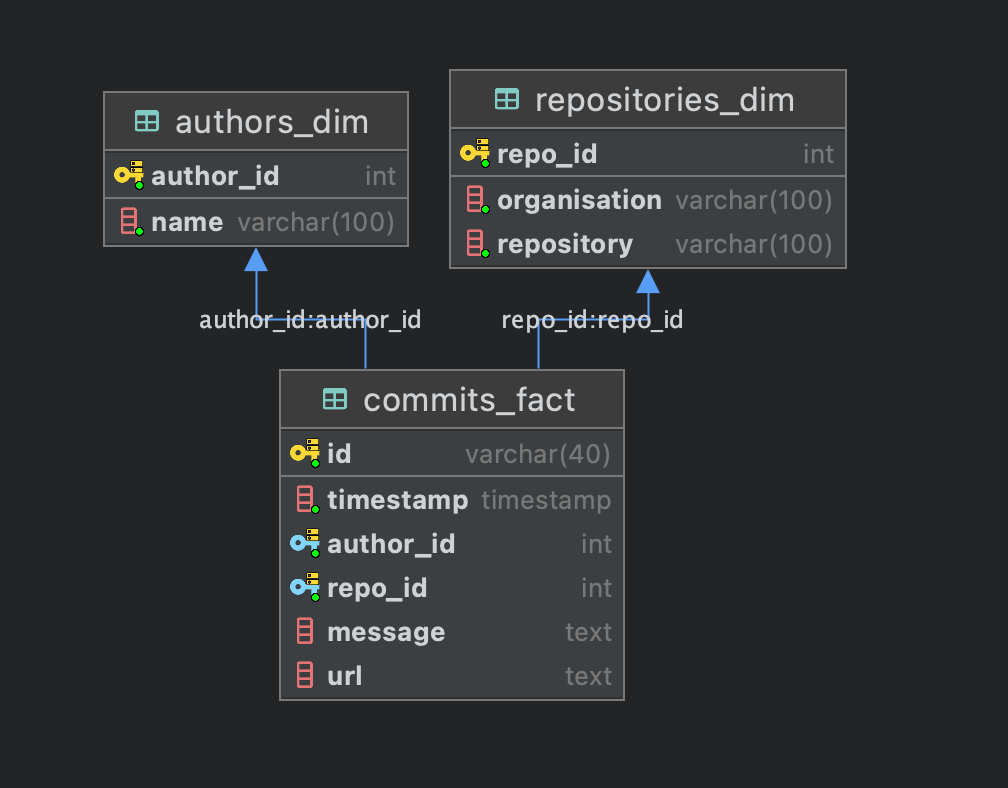- Use poetry to create a virtual environment
poetry installAlternatively use pip
pip install -r requirements.txt- Requests: To get data from Github API
- Pandas: To use dataframes
- SQLAlchemy + PyMySQL: To insert and query data from database
- Loguru: For pretty and easy logging
- Tabulate: For markdown representation of dataframe. Used to display heatmap.
Start up mysql service in docker container
docker-compose upThere exists some pre-existing data inside data/mysql which will be mounted onto the docker container.
create database github_etl;
create table repositories_dim
(
repo_id int not null,
organisation varchar(100) not null,
repository varchar(100) not null,
constraint repositories_dim_repo_id_uindex
unique (repo_id)
);
alter table repositories_dim
add primary key (repo_id);
create table authors_dim
(
author_id int not null,
name varchar(100) not null,
constraint authors_dim_author_id_uindex
unique (author_id)
);
alter table authors_dim
add primary key (author_id);
create table commits_fact
(
id int auto_increment,
timestamp timestamp not null,
date date not null,
author_id int not null,
repo_id int not null,
message text null,
url text null,
constraint commits_fact_id_uindex
unique (id)
);
alter table commits_fact
add primary key (id);
call staging.upsert_all();
INSERT INTO commits_fact
SELECT id, timestamp, author_id, repo_id, message, url FROM staging.commits_fact
ON DUPLICATE KEY UPDATE id=staging.commits_fact.id;
create table STAGING.authors_dim
(
author_id int not null,
name varchar(100) not null,
constraint authors_dim_author_id_uindex
unique (author_id)
);
alter table staging.authors_dim
add primary key (author_id);
create table staging.repositories_dim
(
repo_id int not null,
organisation varchar(100) not null,
repository varchar(100) not null,
constraint repositories_dim_repo_id_uindex
unique (repo_id)
);
alter table staging.repositories_dim
add primary key (repo_id);
create table staging.commits_fact
(
id varchar(40) not null,
timestamp timestamp not null,
author_id int not null,
repo_id int not null,
message text null,
url text null,
constraint commits_fact_id_uindex
unique (id),
constraint commits_fact_authors_dim_author_id_fk
foreign key (author_id) references authors_dim (author_id),
constraint commits_fact_repositories_dim_repo_id_fk
foreign key (repo_id) references repositories_dim (repo_id)
);
alter table staging.commits_fact
add primary key (id);
create table STAGING.authors_dim
(
author_id int not null,
name varchar(100) not null,
constraint authors_dim_author_id_uindex
unique (author_id)
);
alter table staging.authors_dim
add primary key (author_id);
create table staging.repositories_dim
(
repo_id int not null,
organisation varchar(100) not null,
repository varchar(100) not null,
constraint repositories_dim_repo_id_uindex
unique (repo_id)
);
alter table staging.repositories_dim
add primary key (repo_id);
create table staging.commits_fact
(
id varchar(40) not null,
timestamp timestamp not null,
author_id int not null,
repo_id int not null,
message text null,
url text null,
constraint commits_fact_id_uindex
unique (id),
constraint commits_fact_authors_dim_author_id_fk
foreign key (author_id) references authors_dim (author_id),
constraint commits_fact_repositories_dim_repo_id_fk
foreign key (repo_id) references repositories_dim (repo_id)
);
alter table staging.commits_fact
add primary key (id);
call staging.upsert_all();
INSERT INTO commits_fact
SELECT id, timestamp, author_id, repo_id, message, url FROM staging.commits_fact
ON DUPLICATE KEY UPDATE id=staging.commits_fact.id;
create table STAGING.authors_dim
(
author_id int not null,
name varchar(100) not null,
constraint authors_dim_author_id_uindex
unique (author_id)
);
alter table staging.authors_dim
add primary key (author_id);
create table staging.repositories_dim
(
repo_id int not null,
organisation varchar(100) not null,
repository varchar(100) not null,
constraint repositories_dim_repo_id_uindex
unique (repo_id)
);
alter table staging.repositories_dim
add primary key (repo_id);
create table staging.commits_fact
(
id varchar(40) not null,
timestamp timestamp not null,
author_id int not null,
repo_id int not null,
message text null,
url text null,
constraint commits_fact_id_uindex
unique (id),
constraint commits_fact_authors_dim_author_id_fk
foreign key (author_id) references authors_dim (author_id),
constraint commits_fact_repositories_dim_repo_id_fk
foreign key (repo_id) references repositories_dim (repo_id)
);
alter table staging.commits_fact
add primary key (id);
create procedure staging.upsert_all()
BEGIN
INSERT INTO github_etl.repositories_dim
SELECT repo_id, organisation, repository FROM staging.repositories_dim
ON DUPLICATE KEY UPDATE repo_id=staging.repositories_dim.repo_id;
INSERT INTO github_etl.authors_dim
SELECT author_id, name FROM staging.authors_dim
ON DUPLICATE KEY UPDATE author_id=staging.authors_dim.author_id;
INSERT INTO github_etl.commits_fact
SELECT id, timestamp, author_id, repo_id, message, url FROM staging.commits_fact
ON DUPLICATE KEY UPDATE id=staging.commits_fact.id;
END;
If using poetry
poetry run python -m src.mainWithout poetry
python -m src.mainDatabase url: jdbc:mysql://localhost:3306
Login: root
Password: password123
# List the top 3 authors in the given time period
select cf.author_id, name, count(cf.id) commit_counts, organisation, repository
from authors_dim
inner join commits_fact cf
on authors_dim.author_id = cf.author_id
inner join repositories_dim rd on cf.repo_id = rd.repo_id
where repository = "hadoop" and organisation = "apache"
group by cf.author_id
order by commit_counts desc
limit 3;
# 2. Find the author with the longest contribution window within the time period?
# A contribution window is the interval between an author’s earliest and latest commit. The
# commits need not be on consecutive days.
select TIMESTAMPDIFF(second, min(timestamp), max(timestamp)) contribution_window_in_seconds, min(timestamp) earliest_commit, max(timestamp) latest_commit, name, organisation, repository
from commits_fact
inner join authors_dim ad on commits_fact.author_id = ad.author_id
inner join repositories_dim rd on commits_fact.repo_id = rd.repo_id
where repository = "hadoop" and organisation = "apache"
group by commits_fact.author_id
order by contribution_window_in_seconds desc
limit 1;
# Query for heatmap (Still need to pivot using pandas after this)
select count(id) commit_counts, DAYOFWEEK(DATE(timestamp)) day_of_week, floor(hour(time(timestamp)) / 3) hour_of_day
from commits_fact
inner join repositories_dim rd on commits_fact.repo_id = rd.repo_id
where repository = "hadoop" and organisation = "apache"
group by day_of_week, hour_of_day
